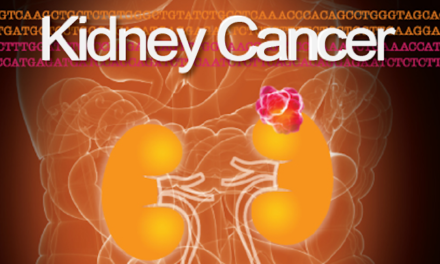
The association of sarcopenia and tumor aggressiveness in clear cell renal cell carcinoma
Abstract
Sarcopenia is associated with poor prognosis, while obesity is paradoxically associated with improved outcomes among renal cell carcinoma (RCC) patients. Underlying differences in tumor biology related to combinations of sarcopenia and obesity have not been described.
We examined how sarcopenia was associated with molecular subtypes of clear cell RCC (ccRCC) among patients who were obese or non-obese. The cohort consisted of 48 ccRCC patients treated by nephrectomy at our institution who were transcriptomically-profiled by the Cancer Genome Atlas. Computerized tomography scans without contrast performed within 60-days of surgery were reviewed to determine skeletal muscle index (SMI). Sarcopenia (yes/no) was classified according to gender-specific international consensus definitions (SMI of < 55cm2/m2 for men and <39 cm2/m2 for women). Obesity (yes/no) was defined as pre-surgical body mass index ≥30 kg/m2. The ClearCode34 gene expression classifier categorized patients into either ccA (less aggressive) or ccB (more aggressive) molecular subtypes. Chi-square or Fisher’s exact tests describe associations between sarcopenia and molecular subtype by obesity status. Statistical significance was regarded as a p-value of <0.05.
The cohort was predominantly male (79%), white (97%), and had localized disease (67%). Median age was 57 years (IQR: 34-79). Overall, 46% of patients were obese, 46% were sarcopenic, and 42% of tumors were ccB subtype. Among patients who were not obese, aggressive ccB subtype was more common in sarcopenic (71%) than non-sarcopenic patients (34%). A similar pattern was observed among patients who were obese; aggressive ccB subtype was more common in sarcopenic (40%) than non-sarcopenic patients (18%).
While preliminary, our findings suggest that sarcopenia is associated with aggressive ccRCC regardless of obesity and lend biologic support to the observation that sarcopenia is associated with poor prognosis. It is not clear whether sarcopenia is a cause or consequence of tumor aggressiveness. Pathway analyses to explore specific mechanisms underlying these observations are underway.
Authors: Sanchez, Alejandro | Petruzella, Stacey | Samson, Marguerite | Akin, Oguz | Paris, Mike | Mourtzakis, Marina | Hakimi, Ari | Russo, Paul | Helena, Furberg
Journal: Kidney Cancer, vol. 2, no. s1, pp. I-S50, 2018

